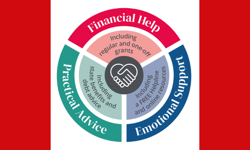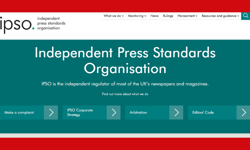Malcolm Gladwell's book, the Tipping Point, was a best-seller and firmly cemented the phrase into the common vocabulary.
We all have a sense of what the phrase means. It is that point when people's behaviour suddenly changes. One day a product's sales are static or in decline; the next, everything changes and the sales go berserk. Since 1995, mobile telephone users have had the facility to text each other, but no-one did. Suddenly, with no help from marketers, it was adopted by the young as the way to communicate and now generates billions of messages each month. Texting had inexplicably reached its ‘Tipping Point’.
Has internet advertising also reached its tipping point where, from nowhere, it has suddenly grown to become the key element in the integrated marketing mix? And, if so, what will be the impact of internet advertising on established media like newspapers? Specifically, will traditional media be able to adapt to change and retain its power and influence over an integrated media world, or will the new media organisations like Google impose their visions of advertising on media and dominate? Is there a window for old media to assert itself and call the shots, or will newspapers accept an increasingly peripheral and subservient role in the future media world?
Growth of internet ad spend
Firstly, has internet advertising reached its own ‘Tipping Point’? In 2001, internet advertising expenditure in the UK was £164m. By 2004, spend on the net had nearly quadrupled to £620m, and in 2005 will reach or exceed £1bn, overtaking all outdoor advertising expenditure in the UK. In 2006, internet advertising will exceed radio and consumer magazine advertising spend combined and will be approaching the £1.8bn spent annually in national newspapers - a figure that has been static for several years. Can we agree with Sir Martin Sorrell, who has said that ‘traditional media owners can no longer afford to hold off going digital because the shift from old to new media is not going to happen in the next generation - there is a tremendous violence in traditional media as it continues to get displaced by digital?’
We are all aware of the growth of jobs advertising on the web. According to the Advertising Association, recruitment advertising accounted for £121m of the £620m spent on web advertising in 2004. Of this £121m, only £7m was spent in the recruitment websites of national newspapers, and £33m in those of the regional press. In other words, what was predominately a business owned by newspapers is now rapidly moving out of their reach to non-newspaper websites (which begs the question – ‘how did newspapers allow this to happen?’).
Paid for search
We are also becoming aware of the rapid growth of ‘Paid-for Search’ advertising, which, in 2004, accounted for £258m of the £620m spent on the web. What is ‘Paid Search’ and why is it so exciting to advertisers? One fundamental reason, according to the Business newspaper, is that the average cost per response to paid search advertising in the United States is $8.50 compared with that of $70 for direct mail. Paid search is simply the provision of an advertisement to someone who is searching the internet for information about a particular topic, using, for example, a search engine like Google. So, if I was looking for a hotel in London for tonight, around the information I was browsing would appear an advertisement for a particular hotel meeting my needs - assessed by the pattern of my search. If it was clear that I was looking for a four star hotel in the West End, an advertisement would be displayed of a West End located four star hotel. A click on the advertisement would lead me into a sales process for that hotel.
I have therefore shown a current interest in a particular purchase; information has been provided immediately to me and a sales process begun - all with my consent, all under my control, and when I am in the market to buy. All advertisers have to do is to bid over the web for that particular space.
Google, worldwide, has 400,000 unique advertiser relationships, and 50% of all search enquiries now carry paid advertisements. Google can show, while it is happening, how many have clicked on to advertised webpages and how many of these clicks have actually led to a purchase. Google is also testing a new service it has named ‘Click-to-call’. A prospect browsing the web sees a telephone icon next to an advertisement that relates to the prospect’s search pattern and, on clicking the icon, is asked for her telephone number. Google’s new system then calls the search user before connecting them to the company selling the goods or services advertised. Google has also launched its own ‘free’ classified site, and is providing free editorial to attract traffic. Following a test in the United States, Google is expecting, in 2006, to launch a video search service that enables broadband internet subscribers to view content for free. AOL recently made advertising revenue by offering free access to a live Madonna concert over the web.
Local threat
Google is also attacking local advertising markets with Google Local. Typically, when people have wanted to find out what is going on in their neighbourhood, they have relied on personal contacts or turned to one of two sources: the Yellow Pages or the local newspaper. Now they can turn to the internet where the biggest internet companies are luring local residents and merchants with powerful, often free technologies that are turning their websites into giant online community centres. Says Sukhinder Singh, chief executive of Google Local, ‘We’ve only just begun - the goal is to provide a much more comprehensive experience than has historically been possible.’
Paid for search does not mean an end to newspaper display advertising, but it may mean more pressure on newspaper rate cards. Google is now buying display advertisement space in newspapers to lead people into websites, and into this world of measured ‘realtime’ advertising. We can expect spend on internet advertising to accelerate, and, perhaps, for companies like Google to spend more in newspaper display advertising - but only at rates that compete with the results achieved by other media. Because search advertising over the internet is so measurable and effective, it could easily become the centre of much advertising strategy, with traditional media acting in a feeder capacity. Indeed, according to the Business, ‘it may not be long before Google buys traditional media companies to maximise margins.’
Strategic dilemma
So, have newspaper owners reached their own tipping point. In late November 2005, Knight Ridder, the second largest newspaper chain in America, put itself up for sale. ‘Circulation’, reported the Business, ‘is down at many of its papers. Like many of its rivals, it is suffering from competition from media groups on the internet as costs are rising and revenues decline. Knight Ridder has been trying to adapt to cyberspace but at too slow a pace.’ Back in the UK, DMGT, owners of the Daily Mail, announced that they were putting their Northcliffe regional newspaper business up for sale, expecting it to raise some £1.5bn. According to the Guardian, this move put a ‘question mark over (the) health of the industry’, because DMGT was ‘a long term owner’ that had ‘remained loyal to its publishing roots.’ According to the Guardian, DMGT ‘denied that the growing power of online property and recruitment advertising was behind the decision.’ Their announcement, nevertheless, put a full 12% on DMGT’s share price.
While newspaper companies were having second thoughts about their core businesses, some were enthusiastically investing in digital ones, such as two property websites, Rightmove and Primelocation. According to the Daily Telegraph, both have received approaches from newspaper groups, which are likely to include News Corporation, the Daily Mail & General Trust and Trinity Mirror. All have already snapped up property sites, with Propertyfinder.com going to News Corp in November for £14.3m, Smartnewhomes.com going to Trinity Mirror in July for £11.3m, and Findaproperty.com going to DMGT in November 2004 for £13.8m. In effect, investment was being transferred from management teams of traditional media, like newspapers, to management teams in the new digital space.
Only the more morose commentators believe that newspapers are finished – the latest Advertising Association long term forecast sees newspapers losing share but staying a major media force. Most see a future where costs are continually challenged to maintain their still highly profitable operations – regional publisher Johnston Press being the most successful with a mighty 33% margin, dwarfing the still respectable 20% achieved by Northcliffe. But it may be that they will increasingly be forced to dance to the digital tune - as digital establishes itself in the centre of the advertising process - and to conform to the digital ratecard.
Time to fight back
Newspaper managements, however, need not necessarily concede the game to their trendier digital cousins. It’s a matter of will, direction and conviction. Newspapers have massive brands - rivalling the best in the UK – and, therefore, the potential to build and sustain highly productive relationships with consumers. They have deep roots in local business. There is absolutely no bar whatsoever to newspaper managements reasserting their traditional hegemony over the classified marketplace through adding value, neither is there any rule that says Google has sole rights to paid-for search. As Rupert Steiner of the Business says, ‘there is nothing to stop the media giants from being proactive and mounting something similar themselves rather than paying a premium to buy into the new model once it has become a threat.’ John Battelle, digital guru and author of the Search, says that ‘the idea of a single search engine will one day sound as foolish as all the old science fiction predictions of the world being ruled by a single computer.’ Moreover, there are many potentially highly profitable services still waiting to be offered by newspaper via digital means. The media world is a rapidly changing place. Whose rules apply is still up for grabs.
FEATURE
Newspapers – what role in tomorrow’s media world?
Newspaper owners are feeling the heat. The emergence of paid for search and the aggressive intrusion by Google & co into our markets is causing great unease in newspaper boardrooms. Yet, says Tony Coad, it is too early to throw in the towel, but what is needed is vision and will.










